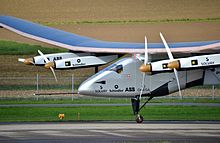



Science and technology in Switzerland play an important role in the Swiss economy, which has very few natural resources that are available in the country. The Swiss National Science Foundation, mandated by the Federal government, is the most important institute for promoting scientific research.
The raw output of scientific research from Switzerland consistently ranks within the top 20.[2] Switzerland was ranked 1st in the Global Innovation Index in 2024, the same position as 2013, 2021, 2020 and 2019[3][4][5]
- ^ Swiss technology powers Mars mission swissinfo.ch 20 February 2002
- ^ Top 20 Country Rankings in All Fields, 2006, Thomson Corporation, retrieved 30 March 2009.
- ^ World Intellectual Property Organization (2024). Global Innovation Index 2024. Unlocking the Promise of Social Entrepreneurship. Geneva. p. 18. doi:10.34667/tind.50062. ISBN 978-92-805-3681-2. Retrieved 22 October 2024.
{{cite book}}:|website=ignored (help)CS1 maint: location missing publisher (link) - ^ "Global Innovation Index 2021". World Intellectual Property Organization. United Nations. Retrieved 5 March 2022.
- ^ Global Innovation Index 2021, Switzerland.